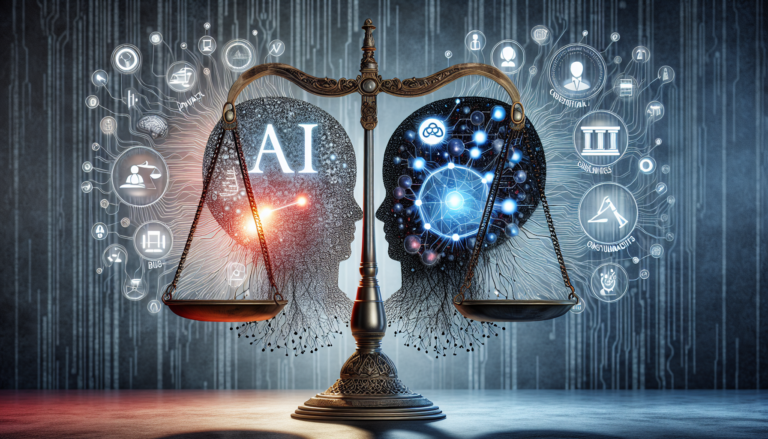In the ever-evolving world of technology, the rapid rise of artificial intelligence (AI) development has sparked both excitement and concern. As AI becomes increasingly sophisticated, we must grapple with the ethical implications that arise from its widespread integration into our lives. From privacy breaches to biased decision-making, these ethical concerns hold the potential to shape the future of AI. In this article, we will explore some of the key ethical concerns in AI development, shedding light on the intricate challenges that lie ahead.

Bias in AI
1.1. Types of bias in AI
Bias in AI refers to the unfair and undesired impacts that can arise from the use of artificial intelligence and machine learning algorithms. There are various types of bias that can emerge in AI systems, including:
-
Data bias: This occurs when the training data used to train AI algorithms is skewed or unrepresentative, leading to biased predictions or decisions. For example, if a facial recognition algorithm is primarily trained on data from one racial group, it may have difficulty accurately recognizing individuals from other racial groups.
-
Algorithmic bias: This occurs when the design or algorithms themselves contain inherent biases. Bias can be unintentionally introduced at various stages, such as feature selection, algorithm design, or even in the choice of objective functions. For instance, if an algorithm is trained to optimize for accuracy without considering fairness, it may disproportionately favor certain groups while making decisions.
-
User bias: This type of bias arises from the input or feedback provided by users. If users exhibit biased behavior or hold biased beliefs, AI systems that learn from user interactions may inadvertently perpetuate or amplify these biases.
1.2. Impact of bias on society
The presence of bias in AI can have significant societal implications. It can perpetuate and reinforce existing social inequalities, resulting in unfair treatment and discrimination. For instance, biased AI algorithms used in hiring processes may disadvantage certain demographic groups, leading to reduced opportunities and exacerbating economic inequality.
Bias in AI systems can also undermine public trust and confidence in technology. If individuals perceive that AI systems are treating them unfairly or making biased decisions, they may become skeptical or resistant to adopting these technologies. This, in turn, can hinder the potential benefits that AI could otherwise offer to society.
1.3. Addressing bias in AI development
To address bias in AI, it is crucial to adopt a multi-faceted approach that involves various stakeholders. Some strategies for mitigating bias in AI development include:
-
Diverse and inclusive data collection: Ensuring that training data used to develop AI systems is diverse and representative of the population is essential. This can help minimize the risk of data bias and ensure fair and unbiased outcomes.
-
Algorithmic audits and testing: Conducting regular audits and testing of AI algorithms to identify and rectify any biases is crucial. This involves evaluating the performance of algorithms across different demographic groups to identify potential disparities and discriminatory impacts.
-
Ethical guidelines and standards: Developing and adhering to ethical guidelines and standards can help promote fairness and transparency in AI development. These guidelines should incorporate considerations of diversity, fairness, and non-discrimination to minimize biased outcomes.
-
Continual monitoring and feedback loops: Implementing mechanisms for ongoing monitoring and feedback from affected communities and end-users can help identify and rectify bias that may emerge over time. Regularly gathering feedback and making necessary adjustments can contribute to reducing and addressing bias in AI systems.
Privacy and Data Protection
2.1. Data collection and consent
An important ethical concern in AI development is the collection and use of personal data. AI systems often rely on vast amounts of data to train and make predictions, raising questions about individual privacy and consent. It is crucial for organizations to obtain informed and explicit consent from individuals whose data is being collected and processed.
Collecting and using personal data without consent or in ways that individuals are not aware of can lead to violations of privacy and erode trust in AI systems. To address this concern, organizations must establish transparent and easily understandable privacy policies, clearly stating the purposes for which data will be used, and ensuring individuals have control over their data.
2.2. Data security and breaches
As AI systems rely on large datasets, ensuring the security of that data is of utmost importance. Data breaches and unauthorized access to sensitive information can have severe consequences for individuals, including identity theft and financial loss.
To address data security concerns, organizations must prioritize robust data protection measures. This includes encryption, secure storage and transmission protocols, regular security audits, and monitoring for potential vulnerabilities.
2.3. Legal and ethical implications
The collection, use, and protection of personal data in AI development have legal and ethical implications. Compliance with relevant data protection and privacy laws, such as the General Data Protection Regulation (GDPR) in the European Union, is crucial.
Organizations must adhere to legal requirements and ethical principles, including the principles of transparency, purpose limitation, and data minimization. Respecting individuals’ privacy rights and promoting responsible data practices can help foster trust and ensure the ethical use of AI systems.

Transparency and Explainability
3.1. Black box problem in AI
The lack of transparency and explainability in AI algorithms has become a significant ethical concern. Many AI systems are referred to as “black boxes” because their internal workings are not easily understandable or explainable, even to the developers themselves. This lack of transparency makes it challenging to understand how the AI system arrives at its decisions or predictions.
The black box problem can be problematic in various contexts, such as financial lending decisions, criminal justice systems, or healthcare diagnostics. When individuals are subjected to automated decisions without any explanation, it can lead to feelings of unfairness, lack of accountability, and reduced trust in AI systems.
3.2. Importance of transparency
Transparency is crucial to address the ethical concerns associated with AI systems. It enables individuals and organizations to understand the factors influencing AI decisions and assess their fairness and reliability. Transparent AI systems allow for increased accountability, enabling stakeholders to identify and correct potential biases or errors.
Transparency also fosters trust between AI systems and users. When individuals have a clear understanding of how AI systems work, they are more likely to accept and rely on these technologies. Therefore, transparency should be a fundamental principle in AI development and deployment.
3.3. Ensuring explainability in AI systems
To ensure ethical development and deployment of AI systems, promoting explainability is essential. Researchers and developers must explore techniques and methodologies that enhance the interpretability of AI algorithms. This includes techniques such as interpretable machine learning models, rule-based systems, and model-agnostic explanations.
Efforts should also be made to provide users with understandable explanations of how AI systems arrive at their decisions. This may involve incorporating visualizations, providing contextual information, or offering alternative explanations when appropriate. Enhancing the explainability of AI systems can contribute to increased trust, accountability, and ethical decision-making.
(Continued in the next reply)






















